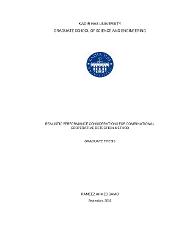| dc.contributor.advisor | Erküçük, Serhat | en_US |
| dc.contributor.author | Samo, Rameez Ahmed | |
| dc.date.accessioned | 2019-07-12T08:40:34Z | |
| dc.date.available | 2019-07-12T08:40:34Z | |
| dc.date.issued | 2016 | |
| dc.identifier.uri | https://hdl.handle.net/20.500.12469/2425 | |
| dc.description.abstract | Combinational cooperative detection (CCD) method is different from the conventional cooperative detection method in the sense that each user may reach a different decision for the activity of the primary user. in the CCD method the locations of the secondary users (SUs) were fixed and selected near the border points of the communication area. The detection performance for SUs at random locations was not considered earlier. The CCD method’s practical implementation was explained with observing different system parameter’s effects on the detection performance for those fixed locations. Carrying previous work done forward in this thesis some realistic performance considerations for the CCD method are assessed. in accordance with that firstly the effect of SUs random locations on the detection performance is considered and compared with the performance for fixed locations. Secondly the effect of distance variations between master and primary user is tested. Finally the effect of different propagation environments on the detection performance of CCD is examined. The results are important to assess the realistic performance of the CCD method. | en_US] |
| dc.language.iso | eng | en_US |
| dc.publisher | Kadir Has Üniversitesi | en_US |
| dc.rights | info:eu-repo/semantics/openAccess | en_US |
| dc.subject | Conventional cooperative detection | en_US |
| dc.title | Realistic performance considerations for combinational cooperative detection method | en_US |
| dc.type | masterThesis | en_US |
| dc.department | Enstitüler, Lisansüstü Eğitim Enstitüsü, Elektronik Mühendisliği Ana Bilim Dalı | en_US |
| dc.relation.publicationcategory | Tez | en_US |
















